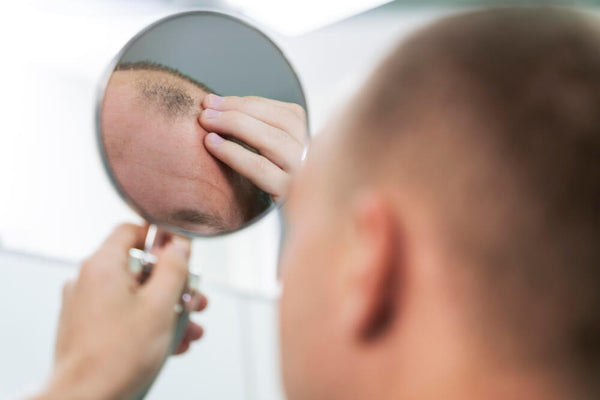We know that feeling all too well. You’re taking a medication you genuinely need, only to watch more and more of your hair circle the drain. It creates a terrible conflict inside—a choice between your overall health and the hair that feels so tied to your identity.
It’s frustrating, it’s emotional, and frankly, it can feel like no one has a real answer for you. The standard advice is often, “talk to your doctor about switching medications,” but what if that’s not an option? What if this drug is essential for your wellbeing?
You don’t have to just accept this as your new normal. Let’s walk through what’s really happening and, more importantly, what we can actually do about it.
How Can a Necessary Medication Lead to Hair Loss?
To understand the solution, we need to understand the problem. Most drug-induced hair loss is a condition called Telogen Effluvium.
Think of your hair growth cycle in two main phases: a long growing phase (anagen) and a short resting phase (telogen). Normally, about 85-90% of your hair is growing at any time. A significant physiological stressor—like starting a new medication, surgery, or a major illness—can shock your system.
This shock pushes a much larger percentage of your hairs into the resting (telogen) phase all at once. Then, about 2-3 months later, those hairs shed. This is why you often don't see the hair loss until weeks after you’ve started the new prescription.
It’s not that the medication is “poisoning” your follicle. It’s that it’s disrupting the delicate biological balance your body needs to sustain hair growth. This is especially crucial for textured hair, which has a more fragile growth cycle to begin with and is more susceptible to stress.
Beyond Chemo: Common Medications That Can Affect Hair
While chemotherapy is the most well-known cause, so many everyday medications can be triggers. And because everyone’s biochemistry is unique, a drug that causes shedding in one person may not in another. Based on what we see in our practice here in Atlanta, some of the most common culprits include:
-
Hormonal Therapies: This includes birth control pills, hormone replacement therapy, and even certain fertility treatments. The sudden shift in estrogen and progesterone can be a major trigger.
-
Medications for Blood Pressure: Beta-blockers and ACE inhibitors are frequently linked to hair thinning.
-
Antidepressants and Mood Stabilizers: SSRIs (like Prozac or Zoloft) and lithium can disrupt the cycle.
-
Anti-inflammatory Drugs: Long-term use of certain medications for autoimmune conditions can be a factor.
-
Acne Medications: Specifically those derived from vitamin A.
-
Thyroid Medications: Even the medications used to treat thyroid conditions can sometimes cause issues if the dosage isn't perfectly calibrated.
The key takeaway? If you noticed a change in your hair about 3 months after starting a new drug, it’s a connection worth exploring.
The Nina Ross Approach: We Find the Root Cause When You Can’t Stop the Med
This is where our functional medicine approach changes everything. A traditional doctor might simply tell you to stop the medication (which isn't always possible) or dismiss your concerns as a "cosmetic" side effect. We go deeper.
We don’t just look at the medication; we look at what the medication is doing to your body’s internal environment. The drug might be the trigger, but the real problem is the underlying nutrient depletion, inflammatory response, or hormonal imbalance it has created.
Our process involves:
-
Comprehensive Lab Testing
We don’t guess. We use advanced diagnostic testing to look at your nutrient levels (like Ferritin, Vitamin D, and Zinc), your thyroid function beyond basic panels, your hormone balance, and markers of inflammation. This shows us the exact impact the medication is having.
-
Creating a Personalized Support Plan
You can’t just take a generic supplement. We create a targeted protocol of medical-grade nutraceuticals to replenish what the drug has depleted and support your body’s natural detoxification pathways.
-
Integrating Advanced Restoration
While we support your body internally, we can also use advanced treatments to actively revive your follicles and promote regrowth. PRP (Platelet-Rich Plasma) Therapy and even more potent Exosome Therapy are incredible tools we use to stimulate healing and growth directly at the scalp, effectively counteracting the shedding signal from the medication.
Your Hair Health Is Non-Negotiable
You should never have to choose between managing your health and loving your hair. The two are intrinsically linked. If you’re struggling with hair loss from a medication you need, there is a path forward that doesn’t involve just suffering through it.
Let us help you find it. We are board-certified experts who specialize in hair loss for melanated women and only offer competent, root-cause solutions. So book your $99 Hair Therapy Evaluation with us today. Together, we’ll create a plan that supports the entire well-being of your hair without any issues.














